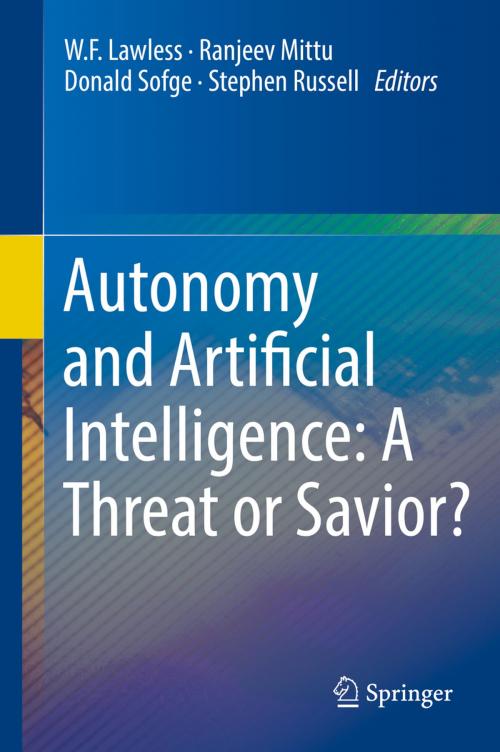Autonomy and Artificial Intelligence: A Threat or Savior?
Nonfiction, Science & Nature, Technology, Robotics, Computers, Advanced Computing, Artificial Intelligence, General Computing| Author: | ISBN: | 9783319597195 | |
| Publisher: | Springer International Publishing | Publication: | August 24, 2017 |
| Imprint: | Springer | Language: | English |
| Author: | |
| ISBN: | 9783319597195 |
| Publisher: | Springer International Publishing |
| Publication: | August 24, 2017 |
| Imprint: | Springer |
| Language: | English |
This book explores how Artificial Intelligence (AI), by leading to an increase in the autonomy of machines and robots, is offering opportunities for an expanded but uncertain impact on society by humans, machines, and robots. To help readers better understand the relationships between AI, autonomy, humans and machines that will help society reduce human errors in the use of advanced technologies (e.g., airplanes, trains, cars), this edited volume presents a wide selection of the underlying theories, computational models, experimental methods, and field applications. While other literature deals with these topics individually, this book unifies the fields of autonomy and AI, framing them in the broader context of effective integration for human-autonomous machine and robotic systems.
The contributions, written by world-class researchers and scientists, elaborate on key research topics at the heart of effective human-machine-robot-systems integration. These topics include, for example, computational support for intelligence analyses; the challenge of verifying today’s and future autonomous systems; comparisons between today’s machines and autism; implications of human information interaction on artificial intelligence and errors; systems that reason; the autonomy of machines, robots, buildings; and hybrid teams, where hybrid reflects arbitrary combinations of humans, machines and robots.
The contributors span the field of autonomous systems research, ranging from industry and academia to government. Given the broad diversity of the research in this book, the editors strove to thoroughly examine the challenges and trends of systems that implement and exhibit AI; the social implications of present and future systems made autonomous with AI; systems with AI seeking to develop trusted relationships among humans, machines, and robots; and the effective human systems integration that must result for trust in these new systems and their applications to increase and to be sustained.
This book explores how Artificial Intelligence (AI), by leading to an increase in the autonomy of machines and robots, is offering opportunities for an expanded but uncertain impact on society by humans, machines, and robots. To help readers better understand the relationships between AI, autonomy, humans and machines that will help society reduce human errors in the use of advanced technologies (e.g., airplanes, trains, cars), this edited volume presents a wide selection of the underlying theories, computational models, experimental methods, and field applications. While other literature deals with these topics individually, this book unifies the fields of autonomy and AI, framing them in the broader context of effective integration for human-autonomous machine and robotic systems.
The contributions, written by world-class researchers and scientists, elaborate on key research topics at the heart of effective human-machine-robot-systems integration. These topics include, for example, computational support for intelligence analyses; the challenge of verifying today’s and future autonomous systems; comparisons between today’s machines and autism; implications of human information interaction on artificial intelligence and errors; systems that reason; the autonomy of machines, robots, buildings; and hybrid teams, where hybrid reflects arbitrary combinations of humans, machines and robots.
The contributors span the field of autonomous systems research, ranging from industry and academia to government. Given the broad diversity of the research in this book, the editors strove to thoroughly examine the challenges and trends of systems that implement and exhibit AI; the social implications of present and future systems made autonomous with AI; systems with AI seeking to develop trusted relationships among humans, machines, and robots; and the effective human systems integration that must result for trust in these new systems and their applications to increase and to be sustained.















